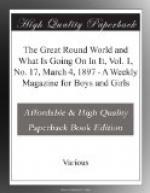His plan was to form a genuine republic, to which boys and girls would be equally welcome as citizens. The plan has been carried out, and the Junior Republic is a great success.
It is an absolute republic, with a government like our own. It has its President, its Senators and Congressmen, and so forth.
Mr. George is the President; the boy and girl citizens form the Congress, the Cabinet officers, the Judge, and the police.
The Constitution of the United States, and the laws of New York State, are followed as closely as possible, and other laws are made to regulate the particular needs of the Republic.
All citizens, boys and girls, are required to work. Nothing is given away in Freeville. The young citizens are paid for their work, and have to support themselves on their earnings.
The boys and girls who will not work get no food.
In all large cities and communities, the people who have money are obliged to pay a certain sum to help others who have none. Therefore men and women who do not work because they are old or ill, are provided with food and shelter from the money, or taxes, that the well-to-do have to pay.
[Illustration]
In Freeville it is different. All the citizens are young and healthy, and able to work, so a law has been passed that no laws shall be made to raise money to keep the idle. No money is set aside to keep paupers, and those who do not work cannot eat. The result is, that there are no paupers or tramps in Freeville.
The way the children earn their money, is by working from eight-thirty till noon every day at farming, landscape gardening, carpentry, cooking, millinery, and sewing.
They are paid according to their skill, and are divided into three grades; unskilled, medium, and skilled labor.
The children naturally try their best to improve, so that they may get higher wages, and thus they gradually progress, and learn their trades.
They are paid every Saturday, like regular laborers, and out of the money they earn, they pay for their board and lodging through the week.
There is a bank in which the thrifty can put their savings, and when they go back to the city they draw these savings out.
The money used is not regular money, but Freeville money, made of cardboard, and at the end of the holiday the children are not given United States money for their savings, but the value of their little hoard in vegetables, fruit, and clothing.
This summer outing teaches the rough boys of the city what their duties in life are, and shows them, better than words could do, that the boy or man who wants to be happy must work honestly and obey the law.
Freeville has its boy policemen, who arrest all evildoers; its jail, where the offenders are locked up; and its gang of convicts, who are only given bread and water, and prison fare, and are kept at work the whole day, instead of from eight-thirty till noon.




